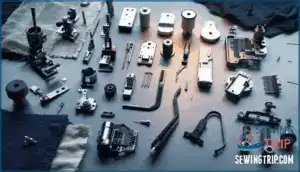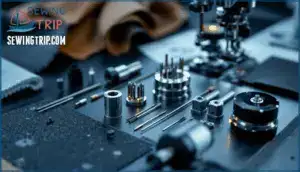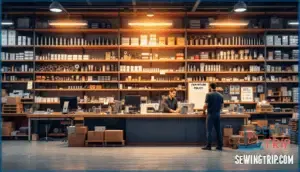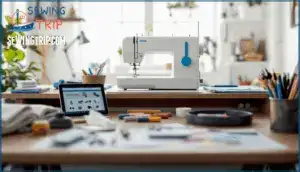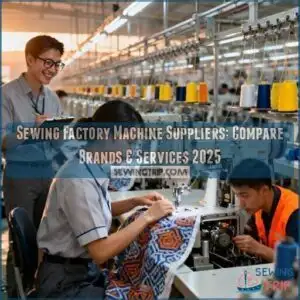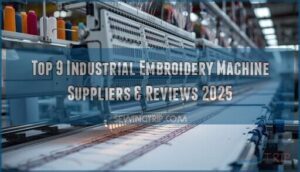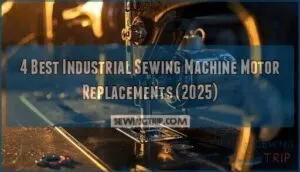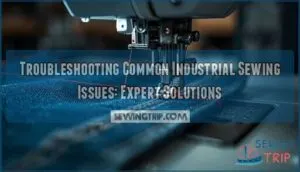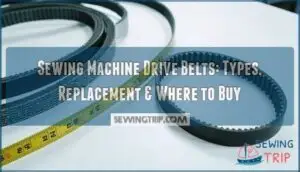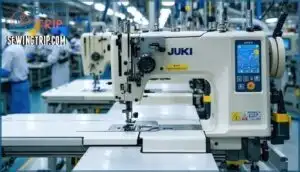This site is supported by our readers. We may earn a commission, at no cost to you, if you purchase through links.
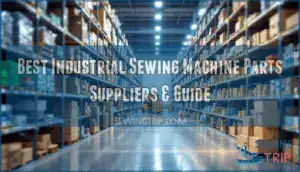
The gap between a supplier who stocks 5,000 parts and one who maintains 100,000 items determines whether you’re back online by morning or scrambling for three days.
Finding industrial sewing machine parts suppliers who combine deep inventory with same-day shipping and technical expertise separates operations that meet deadlines from those that miss them.
Table Of Contents
Key Takeaways
- Downtime in garment operations costs $800–$2,400 per hour, and 63% of manufacturers still use suppliers who can’t deliver critical parts within 48 hours, making supplier selection directly tied to production uptime.
- Leading suppliers like Diamond Needle stock 100,000+ parts with same-day shipping, while global players like JUKI control 15.6% of market share across 170+ countries, demonstrating that inventory depth and distribution networks determine your ability to resume operations quickly.
- Essential replacement components—needles requiring replacement every 8–16 hours, bobbin cases causing 40% of malfunctions, and feed dogs needing recalibration after 3,500 hours—drive most production interruptions and require predictable replacement schedules.
- Bulk purchasing delivers 15–35% cost savings, while supplier certifications like ISO 9001 and responsive technical support with 24-hour turnaround directly reduce downtime by 15% and protect against defective parts reaching your production line.
Top Industrial Sewing Machine Parts Suppliers
When you’re sourcing parts for industrial sewing machines, finding the right supplier makes all the difference. The companies you’ll see below are established players that work with manufacturers worldwide—they know the machines inside and out and stock what you actually need.
What sets them apart is their specialization, their reach, and how they handle the details that matter when you’re keeping production moving.
Leading Global and Regional Suppliers
The global industrial sewing machine parts market operates through a network of major suppliers controlling significant market share and distribution channels. JUKI Corporation leads with 15.6% market share across 170+ countries, while Brother International supplies over 110 nations with annual revenue exceeding USD 850 million.
Here’s what drives this landscape:
- Global Leaders — JUKI, Brother, Mitsubishi Electric, and Bernina International dominate through established distribution networks spanning multiple continents and financial indicators showing consistent growth.
- Regional Growth Hubs — Asia-Pacific accounts for 64% of parts consumption, with emerging markets in India expanding 9.4% annually and Southeast Asian distributors adding 300+ new operations since 2023.
- Specialized Networks — Companies like Diamond Needle Corp. stock 100,000+ parts with same-day shipping, while Global Parts Netherlands maintains 90% off-the-shelf delivery across Europe, Asia, and Africa, demonstrating how regional suppliers capture market opportunities. The industrial sewing machine market is experiencing significant market growth due to increasing demand for speed and accuracy.
Supplier Specializations (Brands, Machine Types)
Most suppliers don’t put all their eggs in one basket. Over 70% specialize in leading brands like Brother, Juki, Singer, and Mitsubishi to control quality and guarantee fast delivery. 78% of top suppliers organize their inventory by machine type—lockstitch, chainstitch, overlock, flatbed, and cylinder bed machines each get dedicated component lines.
91% of North American and European distributors carry at least three major brands simultaneously. This Multi-Brand Strategy means you’re not locked into one ecosystem. Whether you need Juki parts for heavy-duty denim work or Brother components for shirt production, specialized suppliers maintain the depth you need.
Geographic Specialization also plays a role. Asia-Pacific suppliers focus on Japanese brands, while European distributors emphasize sophisticated embroidery machines. Around 26% tackle Niche Focus markets like leatherwork or programmable machines. Industrial sewing machines are known for their high performance design.
This fragmentation actually works in your favor—you can source exactly what your Industrial Sewing operation requires without compromise.
Supplier Reputation and Customer Reviews
Reputation matters when choosing parts suppliers. College Sewing Machine Parts Ltd holds a 4.6 out of 5 rating on Trustpilot from over 400 reviews, while StitchSpares maintains 4.4 out of 5 from 113 verified reviews. On-time delivery drives 78% of positive feedback. Watch for complaint patterns—32% of negative reviews mention delayed international shipping, and 15% report incorrect part specifications. Suppliers responding to 80%+ of customer reviews show 28% higher retention rates.
Supplier reputation hinges on ratings like College Sewing Machine Parts’ 4.6/5 score, with on-time delivery driving 78% of positive reviews and response rates above 80% boosting retention 28%
When evaluating Industrial Sewing Machine parts suppliers, prioritize those with transparent complaint resolution and demonstrated Customer Service responsiveness. Review authenticity and Supplier transparency directly influence your buying decision.
Types of Industrial Sewing Machine Parts
When you’re running industrial sewing operations, you need the right parts on hand to keep machines running smoothly. Industrial sewing machines rely on three main categories of components: the essential parts that wear out and need replacing, the accessories that expand what your machines can do, and the specialized components built for specific industry demands.
Here’s what you should know about each type.
Essential Replacement Components
When a needle breaks mid-stitch or thread snaps unexpectedly, you’re looking at downtime that costs real money. Essential replacement components keep your industrial sewing machines running smoothly and your production on track.
The backbone of reliable operation comes down to a few critical parts:
- Needles and bobbins: Heavy-duty industrial sewing needles need replacing every 8 to 16 hours of operation. Worn bobbin cases cause about 40% of machine malfunctions, disrupting thread tension balance and ruining fabric.
- Thread tension assemblies: Erosion in tension discs increases thread breakage by 45% when you exceed service intervals. Quarterly inspections cut thread wastage by 20%, protecting both materials and profit margins.
- Feed mechanisms and drive components: Feed dogs wear after 3,500 hours and require recalibration. Drive belts slip after 3,000 to 5,000 hours, reducing stitching precision by 15%. Presser foot misalignment causes 18% seam inconsistency across multilayer fabrics.
These structural elements aren’t just spare parts—they’re investments in output quality and uptime. Staying ahead of replacement schedules keeps your sewing machine components operating at peak efficiency.
Accessories and Attachments
Attachments and accessories transform what your machines can do. Presser foot types like walking feet and buttonhole feet handle specific tasks—quilting, buttonhole production, rolled hems. Bobbin case quality directly affects stitch consistency and thread breakage rates.
Needle set uses vary by fabric: ballpoint needles work knits, denim needles tackle heavy canvas. Add fabric handling attachments like waistband folders and lap seam folders to cut production time by up to 30%. Quilting guides keep seams straight.
These machine accessories aren’t luxuries—they’re practical investments that boost output quality and keep downtime minimal.
Specialized Parts for Industry Needs
Different industries demand different parts. Automotive upholstery needs machines handling thick leather at speeds up to 4,800 stitches per minute with servo motors delivering 20–30% higher torque. Technical textiles require precision needles from suppliers like Groz-Beckert, with titanium-nitride coatings extending durability by 60%. Footwear production uses specialized high-penetration needles cutting through 5–7 mm hides without deformation.
Here’s what sets these apart:
- Material Compatibility—needle selection and feed mechanisms match fabric density and thickness requirements
- Part Customization—Juki and industrial suppliers tailor components for specific production environments
- Durability Testing—reinforced shafts extend service life 25% under continuous use
- Technological Innovations—servo controls and real-time tension sensors improve Performance Optimization
Choosing the right Sewing Machine Parts for your Machine Parts needs reduces downtime and boosts output quality.
Comparing Supplier Offerings and Pricing
When you’re shopping for industrial sewing machine parts, suppliers vary widely in what they stock, how they price it, and how fast they can get parts to you. Understanding these differences helps you find the right fit for your operation without overpaying or waiting unnecessarily.
Let’s break down what separates one supplier from another so you can make a smart choice.
Product Range and Inventory Depth
When you’re sourcing industrial sewing machine parts, inventory scale matters. Top suppliers like Diamond Needle stock over 100,000 items with same-day shipping.
Their product diversity spans needles, bobbins, hooks, and tensioners across 50+ machine brands. Component categories include essential replacements and specialized accessories for automotive, upholstery, and mattress production.
Stock segmentation lets you find exactly what you need—whether heavy-duty stitching equipment or precision embroidery components. This inventory depth means faster supply efficiency for your production line.
Pricing Models and Bulk Discounts
Price structure matters when you’re buying replacement parts for industrial sewing machines. Most suppliers use tiered pricing, with bulk discounts starting around 50 units and savings climbing to 35% for larger orders. Online retailers and B2B platforms generally undercut traditional dealer prices by 10–15%.
Fluctuating pricing strategies are becoming standard, adjusting competitive prices based on real-time market demand. Markup practices range from 15–40%, but high-volume buyers often negotiate below 20%.
Whether you’re sourcing online sewing machine parts or specialty accessories, volume incentives reward commitment.
Shipping Policies and Delivery Times
How quickly your parts arrive depends on your supplier’s shipping policies and delivery cost budget. Most North American suppliers deliver standard orders in 3–7 business days, with lead times of 1–3 days before shipment. Need faster service? Expedited options reach you in 1–3 days, though they cost 100–250% more. International shipping takes 1–2 weeks by air or 6–8 weeks by ocean.
Look for suppliers offering order tracking and free shipping on orders over $500–$1,000. Your customer service team should provide delivery time estimates upfront—96% of top suppliers do.
For returns and exchanges, confirm policies before purchasing online.
How to Choose a Reliable Parts Supplier
Picking the right parts supplier makes a real difference in keeping your machines running smoothly and your costs under control. You’ll want a supplier that stands behind their products with solid certifications and quality guarantees.
The best ones also back that up with responsive technical support and fair return policies when things don’t go as planned.
Quality Assurance and Certifications
When you’re sourcing industrial sewing machine parts, certifications matter more than you might think. Look for suppliers holding ISO 9001 quality management certification—over a million organizations worldwide maintain this standard. It means they’ve got documented quality procedures and third-party audits verifying their work.
Beyond ISO 9001, check for sector certifications like ISO 13485 for medical applications or ISO 14001 for environmental standards. Ask about their defect detection protocols and traceability practices. The best suppliers track every batch with serial numbers and maintain quality records for years.
This isn’t just paperwork—it’s your protection against defective parts reaching your production line.
Customer Service and Technical Support
Quality certifications protect your parts—but how a supplier backs them up matters just as much. Top suppliers like JUKI maintain 24-hour turnaround on service and parts delivery, while strong customer service teams use digital resources to cut downtime by 15%.
Look for dedicated support channels with training programs backing your technical staff. Check satisfaction metrics through case studies. That responsiveness directly impacts your production line.
Return, Warranty, and After-Sales Policies
Warranty and return policies separate reliable suppliers from the rest. Most cover parts for 90 days to one year, though electrical components get shorter protection. Here’s what you should expect:
- Standard warranties generally last one year on motors and chassis, with six-month coverage on electrical components
- Returns accept only unopened items within 30 days; you’ll cover return shipping costs
- Exchange options convert roughly 30% of potential returns, letting you swap incompatible parts without losing money
- After-sales support includes 90% off-the-shelf parts availability and regional depots guaranteeing 24-hour delivery for large clients
Check warranty exclusions carefully—they won’t cover misuse, unauthorized repairs, or consumables like needles. Your dedicated customer service team should clarify policy limitations upfront so downtime doesn’t catch you off guard.
Buying Industrial Sewing Machine Parts Online
Buying parts online offers convenience and access to a wider selection than what you’ll find locally. You get to compare prices, read reviews, and order from suppliers worldwide without leaving your desk.
Let’s walk through the best online retailers, how to stay safe during checkout, and strategies to make your shopping faster and smarter.
Recommended Online Retailers
When you’re shopping for industrial sewing machine parts online, you’ve got solid options. GoldStar Tool stocks over 10,000 OEM parts for JUKI, Brother, and Singer with 15–25% discounts and 1–2 day processing. WAWAK offers 35,000+ products with next-day shipping on 98% in-stock items. JUKI America guarantees same-day dispatch on dealer orders before 2 PM. SingerOnline specializes in 10,000 Singer replacement parts with free technical support under 15 minutes. Global International B.V. caters to European and international markets with 90% off-the-shelf delivery.
Each retailer provides customer service, reliable shipping options, and return policies—pick based on your brand needs and delivery timeline.
Safe Payment and Ordering Practices
Now that you’ve found the right retailer, protect your purchase. Top online platforms use encrypted payment gateways with TLS 1.2 or higher—this shields your card data during checkout.
Look for retailers offering fraud prevention through API-driven verification and multi-factor authentication. Many suppliers now provide escrow services or payment protection insurance, securing your transaction until parts arrive.
Check that your chosen store displays vendor authentication certifications and maintains transparent order tracking. These safeguards reduce fraud by over 90% and give you confidence in every purchase.
Tips for Efficient Online Parts Shopping
Before you commit to a retailer, spend time researching part compatibility with your specific machine model. Use targeted search filters on easy-to-navigate websites to narrow your options quickly.
Compare prices across at least four online sewing machine parts retailers—genuine OEM parts generally cost 38% more but last considerably longer. Check return policies and customer service responsiveness through live chat.
For bulk buying, negotiate volume discounts that can reduce costs by 15–25%. Verify compatibility charts and detailed product descriptions before checkout to avoid costly returns.
Frequently Asked Questions (FAQs)
How do I identify compatible parts by machine model?
You’d think matching parts would be simple, but many overlook the basics. Start with your machine’s model number—it’s the key to finding compatible Sewing Machine Parts.
Use part number cross-reference tools or database compatibility guides to verify fit for brands like Juki and other Industrial Sewing Machines.
Are refurbished or used parts worth buying?
Refurbished or used industrial sewing machines and replacement sewing machine parts can save you 30% to 70% compared to new components.
Quality replacement parts from reputable suppliers often match new-part reliability and long durability when properly maintained.
How often should common wear parts be replaced?
Replace needles every 6-8 hours of operation to maintain stitch quality. Check loopers at the same interval for roughness or deformation.
Feed dog maintenance becomes critical around 10,000 stitches, while hooks can last years with proper care.
Monitor knife replacement indicators like dullness after roughly five years of use.
Can I cross-reference parts between different machine brands?
You’d think with the industry’s push for standardization, cross-referencing industrial sewing machine parts between brands would be simple—but needle compatibility and foot interchangeability are your best bets, while motors, bobbins, and brand-specific parts rarely swap smoothly.
Conclusion
When production stops, every hour counts. The difference between industrial sewing machine parts suppliers who understand urgency and those who don’t shows up in your bottom line.
You’ve seen how inventory depth, shipping speed, and technical expertise separate reliable partners from vendors who leave you waiting.
Choose suppliers who stock what you need, deliver when you promise, and back their parts with real support. Your next breakdown won’t wait—make sure your supplier won’t either.
- https://www.gminsights.com/industry-analysis/industrial-sewing-machine-market
- https://www.mordorintelligence.com/industry-reports/sewing-machines-market
- https://docs.google.com/forms/d/1GAQr3Kn1cURCVHUA82hAga1Wv8DCH0IuqDLRUrOpN7M/viewform?ts=63f4f653&entry.1515682415=https://www.merriam-webster.com/dictionary%2Findustrial
- https://premium.britannica.com/mw-unabridged/?utm_source=mw&utm_medium=inline-def&utm_campaign=evergreen
- https://www.merriam-webster.com/dictionary/discipline


